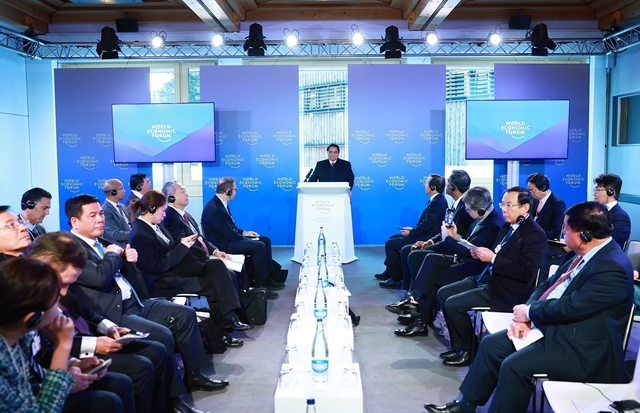Việt Nam to promote new growth drivers to unleash potential and realise strategic goals_kết quả trận rayo vallecano
Việt Nam to promote new growth drivers to unleash potential and realise strategic goals
January 21,kết quả trận rayo vallecano 2025 - 20:47 |
| Prime Minister Phạm Minh Chính addresses the Việt Nam’s National Strategy Dialogue themed "Unleashing Việt Nam's growth potential: Promoting investment and innovation for a strong future". VNA/VNS Photo |
DAVOS Prime Minister Phạm Minh Chính has affirmed that Việt Nam will focus on renewing traditional growth drivers such as investment, export, consumption and promote new drivers including the digital economy, the circular and sharing economy, to unleash growth potential with an aim to realise strategic goals by 2030 and 2045.
He was speaking in Davos on Tuesday at the Việt Nam’s National Strategy Dialogue themed 'Unleashing Việt Nam's growth potential: Promoting investment and innovation for a strong future'.
Attending the dialogue were World Economic Forum (WEF)’s Head of Regional Agenda for Asia-Pacific Joo-Ok Lee and more than 60 leaders of global corporations, which are also WEF members.
This is one of the few national dialogue activities held at the WEF Daos this year and is the fourth National Strategy Dialogue that WEF has organised with Việt Nam.
The attending representatives of corporations expressed their strong impression with the Việt Nam’s economic growth rate of over seven per cent in 2024 and the management outcomes of the Vietnamese Government, within the context of the world economy facing many challenges. The corporations highly appreciated the attractive investment opportunities of the Vietnamese economy.
They want to learn about Việt Nam's mechanisms and policies to encourage investors to participate in areas such as infrastructure, liqied gas, healthcare, oil and gas industry, hotels as well as policies to ensure power sources, clear procedures to implement projects, ensure human resources and remove export restrictions in some important markets of Việt Nam.
Analysing the Việt Nam’s growth potential, PM Chính highlighted the self-reliance of the economy when it has to cope with difficulties due to being a transitional economy, with a modest economic scale and large openness, and facing natural disasters and climate change that caused a lot of damage, especially Typhoon Yagi.
The typhoon reduced the country’s GDP growth by about 0.15-0.2 per cent in 2024, but Việt Nam still exceeded all 15 out of 15 socio-economic development targets, he said.
He said Việt Nam will take science and technology, innovation and digital transformation as new driving forces.
“In 2025, Việt Nam will continue to prioritise promoting growth associated with maintaining macroeconomic stability, controlling inflation, ensuring major balances of the economy, striving to achieve a growth rate of at least eight per cent this year and reaching double digits in the following years,” he said.
Việt Nam will focus on three strategic breakthroughs :institutions, infrastructure and human resources towards open institutions, transparent infrastructure and smart human resources and governance.
Việt Nam looks to make breakthroughs in building synchronous and modern infrastructure including both hard and soft infrastructure and infrastructure in transport, energy, climate change response, healthcare, education, sports, as well as digital and social infrastructure, he said.
Chính shared with participants about Việt Nam’s key infrastructure projects including the plan to complete the North-South high-speed railway in about ten years, the anticipated construction of the railway project connecting with China this year, the building of nuclear power plants in five years and the goal of finishing at least 3,000km of expressways in 2025.
“Việt Nam is set to make a breakthrough in human resources, especially training high-quality resources in emerging industries and fields in the digital age such as semiconductor chips, artificial intelligence, cloud computing, internet of things, optoelectronics to meet the needs of businesses and investors and improve labour productivity,” he said.
Chính affirmed that Việt Nam will continue to strongly promote internal resources including people and nature, especially exploiting new development spaces such as marine space, underground space, outer space and cultural and historical traditions. Việt Nam determines to develop rapidly but sustainably, taking people as the centre, not sacrificing progress, fairness, social security and the environment to pursue merely economic growth.
Responding to the participants’ concerns in the semiconductor sector, he said Việt Nam has implemented a training programme for 50,000 semiconductor engineers and is committed to no shortage of electricity with synchronous solutions, including developing wind power, solar power, nuclear power and importing electricity.
Regarding the concerns about the real estate sector, he said Việt Nam will continue to improve institutions and laws on land and real estate associated with strategic infrastructure development in order to open up new development spaces and encourage investors to the one million social housing apartment project.
He requested that partners and investors continue to accompany and cooperate with Việt Nam in priority development areas and in giving feedback on building and perfecting institutions, attracting high-quality investment and providing financial incentives. VNS
本文地址:http://vip.rgbet01.com/html/20d499669.html
版权声明
本文仅代表作者观点,不代表本站立场。
本文系作者授权发表,未经许可,不得转载。